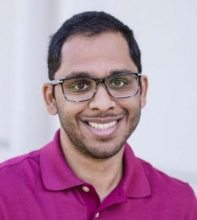CBE Seminar: From Grandma's Recipes to Precision Baking - Charting the Next Frontier in Computational Catalysis

Associate Professor
Department of Chemical Engineering
UC Davis
Non-UCI people, please use this registration link: https://forms.gle/xb1t3kF9eiEGw98d7
Abstract: The democratization of machine learning (ML) and the advent of open-access data repositories are revolutionizing the field of computational heterogeneous catalysis. These advances, coupled with development of new workflow management tools and increasing access to growing computational resources, have enabled high-throughput screening of catalyst libraries at unprecedented scales. However, compared to numerous reports of in-silico discoveries of novel catalysts for various reactions, the expected acceleration in lab-scale synthesis, performance evaluation and the downstream development of novel catalytic process has been relatively lackluster. In light of the growing severity of the climate change crisis and the central role of catalytic processes within energy, chemicals and environmental protection technologies, there is an urgent need to bridge the gap between the computational discovery and experimental realization of promising catalysts.
Specifically, while state-of-the-art theoretical approaches can help identify promising active sites for a given reaction, current methods are largely incapable of predicting the synthetic pathways necessary for the experimental realization of the target catalyst consisting of the desired active sites. Using examples spanning zeolites, metal-organic frameworks and supported oxide catalysts, this talk will illustrate the capabilities and limitations of the current computational methods. A central goal is to demonstrate the unique insights provided by theory in close collaboration with experimentalists. An example discussed in detail is the development of a theory-based approach to fitting Extended X-Ray Absorption Fine Structure (EXAFS) data, providing unprecedented structural detail and confidence in the local binding environment for “single-atom” catalysts. Another motivating case study is the use of surface-enhanced Raman spectroscopy (SERS) as a probe — illustrated with an ML-based classifier that minimizes user intervention and accelerates data collection for downstream analysis for early-stage disease diagnostics. Taken together, this talk will present a cohesive vision for the expanding role of theory and data science (used judiciously in conjunction with experimentation) to address challenges central to current and emerging technological needs.
Bio: Ambar Kulkarni is an associate professor in the Department of Chemical Engineering at UC Davis. After receiving his bachelor's degree from the Institute of Chemical Technology (formerly UDCT), Mumbai (India), he moved to the U.S. to complete his doctorate (Georgia Tech, with David Sholl) and postdoc (Stanford, with Jens Nørskov). Over the last four years, his research group has focused on combining advances in multiscale molecular modeling and machine learning with multifaceted experimental collaborations to addresses the challenges in catalysis, separations and chemical sensing. His research group has experience with a variety of functional materials (e.g., zeolites, metal-organic frameworks (MOFs), metals, oxides), simulation methodologies, and automated analyses of experimental results (e.g., X-ray absorption spectroscopy, NMR spectroscopy, surface-enhanced Raman spectroscopy). The Kulkarni group is supported through grants from the National Science Foundation (NSF), the Department of Energy (DOE), the Center for Data Science and Artificial Intelligence Research (CEDAR UC Davis), and several industry partnerships.
Kulkarni’s interdisciplinary research and teaching was recognized with the UC Davis College of Engineering Outstanding Junior Faculty Award for Excellence in Research and UC Davis College of Engineering Best Teaching Award in 2021. He received a 2021 NSF CAREER award for his work in designing MOFs for electrochemical applications. As the inaugural UC Davis Graduate Mentor Fellow (2020 – present), Kulkarni has developed a series of mentorship workshops for UC Davis faculty aimed at improving the graduate student mentorship experience. When he is not staring at molecules on the computer screen, Kulkarni and his wife enjoy traveling to different countries, snowboarding and playing with their dog.
Host: Assistant Professor Erdem Sasmaz
Share
Upcoming Events
-
MAE 298 SEMINAR: Europa Clipper Mission Design
-
CBE 298 Seminar: Metal Electrodeposition for Modern Mineral Refining
-
MSE 298 Seminar: Quasi-1D/2D Charge-Density-Wave Materials - From Exotic Physics to Application Prospects
-
EECS Seminar: Steering Diffusion Models for Generative AI, From Multimodal Priors to Test-Time Scaling
-
CBE 298 Seminar: Finding Catalysts of Gut Reactions - The Gut Microbiota in Disease Onset and Treatment
